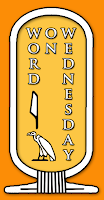
Ostraca: pronounced "oh-stra-ka"
Osctraca is a thin, smooth flake of limestone used by ancient Egyptians for making notes, sketches and calculations.
Basically, in the Nile Valley, people had access to a lot of this type of stone. Limestone is unique in that it flakes very easily when you chip at it. Hand-sized flakes could be separated from the larger block. They would be extremely thin and flat. This made them perfect for writing quick notes on, especially since very few people had easy access to papyrus paper. You might call Ostraca the 'sticky-note' of the ancient world!
Not only was Ostraca more affordable than papyrus, it was a lot more durable. In fact, it pretty much lasts forever. Why is this good? Well, for us it's great. It means we can dig up their ancient notes and read them. That is pretty amazing, you have to admit. To be able to read notes written thousands of years ago by everyday people? In fact, it's quite incredible and useful too.
Papyrus paper dissolved after a certain amount of time, unless it was stored carefully in a dry tomb. On the other hand, many notes kept in households on Ostraca still exist today. These Ancient Egyptians notes scribbled on ostraca have lasted through the ages. We can piece together a picture of their lives by reading them. We can find out record-keeping details such as items they purchased or bartered for, as well as notes written between friends, families, and couples.
Not only was Ostraca more affordable than papyrus, it was a lot more durable. In fact, it pretty much lasts forever. Why is this good? Well, for us it's great. It means we can dig up their ancient notes and read them. That is pretty amazing, you have to admit. To be able to read notes written thousands of years ago by everyday people? In fact, it's quite incredible and useful too.
Papyrus paper dissolved after a certain amount of time, unless it was stored carefully in a dry tomb. On the other hand, many notes kept in households on Ostraca still exist today. These Ancient Egyptians notes scribbled on ostraca have lasted through the ages. We can piece together a picture of their lives by reading them. We can find out record-keeping details such as items they purchased or bartered for, as well as notes written between friends, families, and couples.
FUN FACT:
The word ostracized comes from Egyptian ostrich
And what was it called when a senator was removed because lots of people dropped ostrica with his name into the complaint vase?
Ostracism.
People would say he had been ostracized. Pretty fascinating to hear where words come from, isn't it?
So there you have it! Now you know the definition of the word Ostraca.









